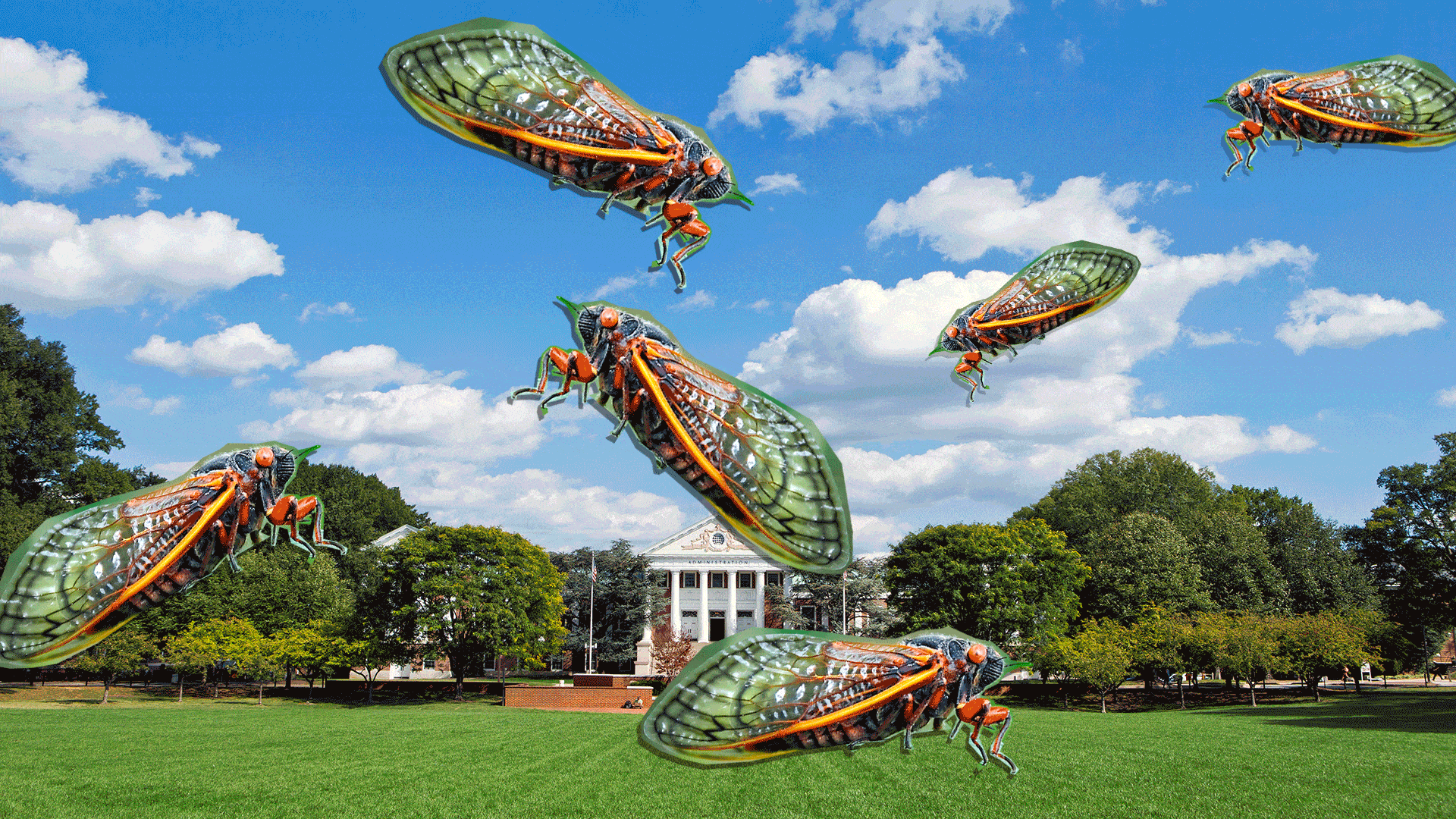- April 09, 2021
- By Chris Carroll
Maybe you’re thrilled at the chance to live out a scene from a weird sci-fi film. Perhaps you’re already cowering under the covers, fighting entomophobia.
Whatever you’re feeling, the cicadas of Brood X, by far the largest group of 17-year cicadas, are preparing to pop out of the ground, shed their exoskeletons, climb trees and other plants and sing their deafening song.
Starting in late April and peaking in late May, the giant, 1- to 2-inch, red-eyed bugs will emerge in astonishing numbers—up to 1.5 million per acre—and our area will become ground zero for one of the planet’s strangest biological spectacles.
Maryland Today spoke to Mike Raupp, UMD professor emeritus of entomology, University of Maryland Extension specialist and “The Bug Guy,” for tips on how to maximize your awe while minimizing the “ewww.”
Learn what the buzz is about
Particularly if you’re nervous, Raupp recommends reading up on the cicadas (including through the University of Maryland’s Cicada Crew), because familiarizing yourself with their unique lifecycle might just push your interest level past your fear.
“You’ll learn they’re not going to attack, bite, sting, grab small dogs and children and carry them away like the monkeys in ‘The Wizard of Oz,’” he said. “If they run into you, they’re not doing it on purpose. These are rambunctious, kind of bumbling insects that are part of a bizarre and wonderful natural event.”
Think of them as an amorous, ’90s-style boy band
In addition to the billions of insects, love is in the air, Raupp said: “It’s all about romance. It’s only the males that sing, and they are sex-crazed. That’s what this big boy band up in the trees is all about—singing their hearts out for that special someone to convince her she’s the one who should be the mother of his nymphs.”
Guard the yard
Although it may bring to mind a biblical plague of locusts, cicadas aren’t interested in consuming your garden. They can cause damage to plants and immature shrubs or trees when females deposit the hundreds of eggs each is capable of laying, so Raupp recommends putting off planting them until fall, or shrouding them in cicada netting with holes less than a centimeter, which his research has shown can prevent any damage when used correctly. Although minor cosmetic damage may be apparent on mature trees, they won’t be harmed, he said.
...And yourself!
Be aware that cicada excrement, aka, “honeydew,” will be dripping down from large trees. Don’t get honey-done, or at least wear a broad-brimmed hat! And to avoid getting swarmed by confused insects who think your buzzing mower or power tool is a come-on, do yard work when they’re sleepy, around sunrise or sunset.
Don’t dispose of the bodies
When they finally expire, they’ll make a temporary stink, although nothing unbearable, Raupp said. There’s no need to rake them up and throw them away.
“These guys have been sucking sap for 17 years and taking from the tree, and now they’re going to give back,” he said. “Their little bodies rain down and fertilize all the plants. It’s the circle of life.”
In fact, research shows that tree growth accelerates after the cicadas arrive, perhaps because of the extra fertilizer or the soil aeration caused by their tunneling to the surface, he said.
Put pets’ enthusiasm on a leash
Cicadas are a natural bounty of protein, and unlike many of us, animals are smart enough to take advantage of it to get a free banquet. But sometimes Fido can take it too far.
“They’re a good source of nutrition, but don’t let your pets eat bucketloads of these things,” Raupp said. “We have had reports of dogs being impacted with digestive discomfort from eating all those exoskeletons.”
Have them over for dinner—as the main course*
Hey, you eat soft shell crabs, so why not their distant relatives—soft shell cicadas? Raupp himself, who once dined on cicadas with Jay Leno on “The Tonight Show,” will be indulging, while trying to understand why that grosses people out so much.
“I find it a bit unusual people will eat a raw oyster, or raw clams,” he said. “What does an oyster do for its living? It sits at the bottom of the Chesapeake and filters you-know-what out of the water. Compared to that, how is a cicada sipping plant sap underground for 17 years detestable?”
And if it’s a real problem…
For those struggling with a phobia related to the insects, Raupp said talking to a therapist could ease anxiety. Another tip for avoiding the stress is to get out of the Mid-Atlantic, or at least hit the beach. “There won’t be any cicadas in Ocean City,” he said.
*Keep an eye out for a Maryland Today story later this month featuring cicada recipes.
